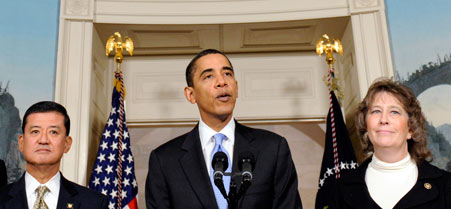VA employee presents cost-cutting idea to Obama despite snow
Colorado-based winner of the SAVE contest travels to Washington to discuss her proposal with the president.
 VA employee Nancy Fichtner stands with VA Secretary Eric Shinseki and President Obama in the White House.
VA employee Nancy Fichtner stands with VA Secretary Eric Shinseki and President Obama in the White House.
Despite the shutdown of the federal government following a record-breaking snowstorm, Veterans Affairs Department employee Nancy Fichtner reported to work on Monday to present President Obama with an award-winning proposal to cut an estimated $3.8 million in the fiscal 2011 budget.
Fichtner, who works out of Grand Junction VA Medical Center in Colorado, traveled to Washington to recommend that her department allow patients to keep medications they have been taking at VA hospitals instead of throwing them away upon discharge. This was one of 38,484 ideas for cutting federal spending that government employees submitted to the Office of Management and Budget.
Employees' proposed plans, along with major contracting reforms, "will save Americans billions of dollars," Obama said during a White House briefing with reporters, after meeting with Fichtner in the Oval Office. The administration conducted the employee-only competition through a secure Web site to stimulate innovation in government.
Obama on Monday also announced that the budget-cutting contest will become an annual event. "At a time when we face not only a fiscal crisis, as well as a host of other crises ... business as usual just won't cut it," he said.
Fichtner, a single mother and avid hunter, told reporters in an interview that she had always questioned why her VA facility would throw out items such as eye drops and inhalers.
"We're putting a stop to it," Obama said, flanked by Fichtner, VA Secretary Eric Shinseki and OMB Director Peter R. Orszag. Such new procedures "might not be the most glamorous reforms ... but these cuts add up."
The goal of the SAVE, or Securing Americans Value and Efficiency, award was to generate financial savings while enhancing government operations. The Obama administration encouraged employees to enter more than one line item and continue suggesting ideas after the contest closed. The reward for the winner was a chance to meet the president and to see her cost-cutting proposal included in the fiscal 2011 budget request due out early next year. Contestants' entries were judged based on criteria that included whether the idea would generate immediate quantifiable budget decreases, yield better results, simplify processes, speed government operations, produce concrete benefits for citizens or the environment and be feasible enough to implement in a timely fashion.
Agencies soon will be required to hold such contests under an open government directive that the administration issued on Dec. 8. The guidance calls for OMB to issue regulations stipulating how agencies are to use prizes and other incentive-based strategies to find new means of fostering transparency, collaboration and participation in government.
Fichtner was one of four finalists OMB asked the public to vote on through the White House Web site earlier in December. Online voting is another method the administration has increasingly used to encourage civic participation. Past examples include a vote on questions that Obama should answer during an online town hall meeting and a vote on rules that should go into the open government directive.
The other three finalists' money-saving proposals involved technology. Huston Prescott from the Housing and Urban Development Department advised that when grant-making agencies perform redundant inspections of subsidized housing that fall under multiple agency jurisdictions, they standardize data formats to save inspectors' time and taxpayers' money. Christie Dickson from the Social Security Administration recommended that the government let people schedule Social Security appointments online.
Julie Fosbender, who works at the Monongahela National Forest in West Virginia, suggested simplifying the process of depositing camper fees through Internet banking. In Fosbender's region, the collection process currently involves turning cash into a money order, completing paperwork and then sending all materials -- by certified mail -- to a bank in California every week. Under her proposal, forest rangers would be allowed to deposit fees into local banks. The government would then transfer the money via online banking.
NEXT STORY: The Year of the Earmark Restraint?






